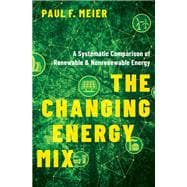Energy comes in many shapes and forms, from wind, solar power, geothermal, and biomass to coal, natural gas, and petroleum. The energy we consume is constantly changing, but the use of these resources-whether renewable or nonrenewable-has long-term impacts on our planet. While there has been this recent shift to renewable energy within the United States, the worldwide demand for all energy types continues to increase at a rapid rate. In fact, it has increased by 84% over the past twenty years. Despite their dwindling supply, these resources are still heavily relied on today. Coal still accounts for 30% of the electricity generated by the United States, even though natural gas is now the primary energy used to produce electricity. Likewise, only 7% of electricity usage worldwide is linked to solar and wind energy.
In The Changing Energy Mix, Paul F. Meier compares twelve renewable and nonrenewable energy types using twelve common technical criteria. These criteria span projected reserves, cost to the consumer and supplier, energy balances, environmental issues, land area required, and lasting impacts. While explaining the pros and cons of these resources, Meier takes readers through the history of energy in the United States and world. He provides insight into energy sources, such as wind-powered and solar-powered electricity (which did not exist until the mid and late 80s, respectively), and he explains the constantly evolving world of energy. Breaking down the potential promises and struggles of transitioning to a more renewable energy-based economy, Meier explains the positive and negative implications of these various sources of energy. The resulting book equips readers with a unique understanding of the history, availability, technology, implementation cost, and concerns of renewable and nonrenewable energy.








